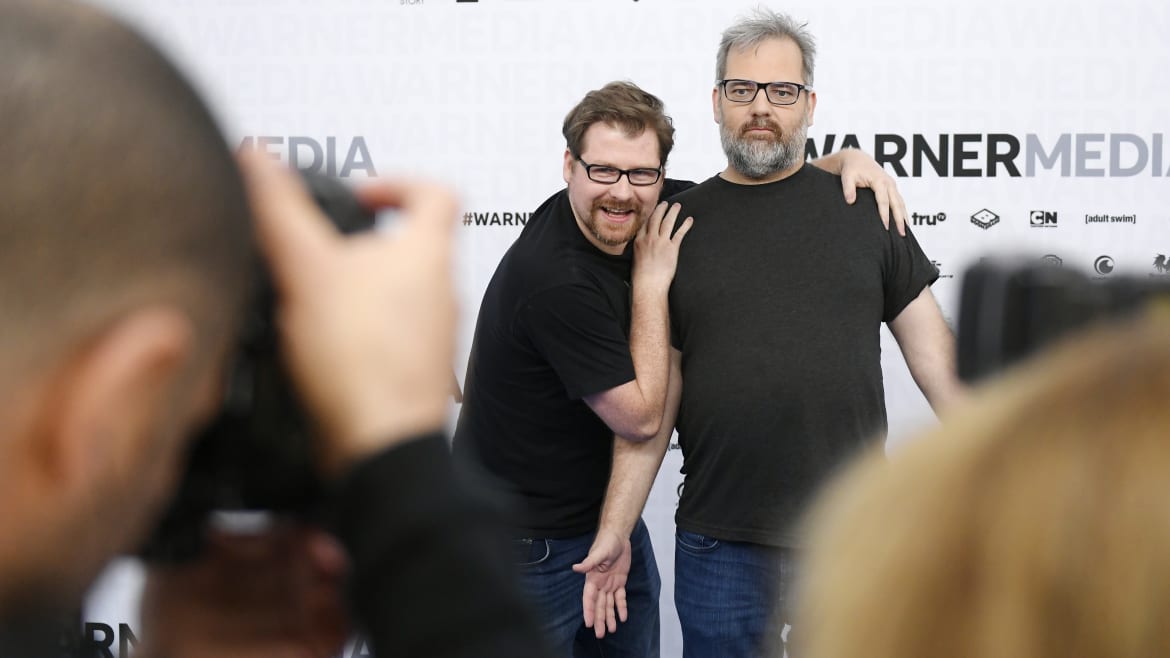In a new interview, Dan Harmon opened up about his career, his past controversies, and, for the first time, about the allegations that arose earlier this year against his Rick and Morty co-creator, Justin Roiland, which his attorneys have denied.
Journalist Lacey Rose, who first interviewed Harmon for The Hollywood Reporter in 2013, caught up with Harmon for an expansive follow-up interview a decade later. Since their first meeting, both his career and the industry have changed significantly, as has his relationship with Roiland.
In January, NBC News reported that in May of 2020, Roiland had been charged with domestic battery and false imprisonment and pled not guilty. Adult Swim severed ties with Roiland less than two weeks later. In March, Kimberly Edds, spokeswoman for the Orange County District Attorney’s office, confirmed in a statement that the state had dismissed the charges due to “insufficient evidence to prove the case beyond a reasonable doubt.” In his own statement at the time, Roiland railed against the “horrible lies that were reported about me during this process.”
Then, in September, NBC News published a follow-up report that alleged, based on interviews with 11 sources who also shared “pictures, videos, social media posts, emails, and plane ticket and Uber receipts,” that Roiland had “use[d] his fame to strike up conversations and develop relationships with young fans, including some who were underage.” That report also alleged that Roiland had sexually assaulted a fan by forcing her to perform oral sex after she’d said “no.” When contacted by NBC News, Roiland’s attorney, Andrew Brettler, called the allegations “false and defamatory” and noted that some had been previously published online.
During his initial THR interview, which took place before NBC News’s September follow-up, Harmon said he’d felt some denial as Rick and Morty worked to recast Roiland—who’d previously voiced both of its lead characters. “It’s all just sad because the goal is for it to be indistinguishable,” Harmon told THR, adding that “at the same time, it would be absurd to suddenly decide that the entire foundation of your creative project was, oh, coincidentally, unimportant.”
By the time the two had spoken next, Rose writes, Harmon had read the second NBC News report. At that point, he wanted to speak out further.
“I would feel so safe and comfortable making this about me,” Harmon said, “but that trick is worthless here and dangerous to others. It’s other people’s safety and comfort that got damaged while I obsessed over a cartoon’s quality.”
Harmon continued: “Trust has now been violated between countless people and a show designed to please them. I’m frustrated, ashamed and heartbroken that a lot of hard work, joy and passion can be leveraged to exploit and harm strangers.”
In addition to the Roiland accusations, Harmon’s interview also addressed his own #MeToo controversy from back in 2018, when he apologized to former Community writer Megan Ganz for treating her, in his words at the time, “like garbage” after she’d rejected his repeated romantic advances. As THR notes, he even dedicated time on his podcast to discussing the matter further.
“I was the one writing her paychecks and in control of whether she stayed or went, and whether she felt good about herself or not, and said horrible things,” Harmon said on his podcast at the time. “Just treated her cruelly, pointedly. Things that I would never, ever, ever have done if she had been male and if I had never had those feelings for her, and I lied to myself the entire time about it and I lost my job, I ruined my show, I betrayed the audience, I destroyed everything, and I damaged her internal compass, and I moved on.”
Ganz accepted his apology back then, calling it a “master class in How to Apologize.” Looking back on the moment, Harmon seems to be at peace about it. As he put it to THR, “I felt like I owed honesty there. After all, what is the other option? You make your fucking brand about talking about your shit and calling yourself an asshole, and then you’re just leaving these parts out?”


deleted by creator
Dan’s take:
Sarah’s:
https://uproxx.com/tv/why-community-fans-should-be-happy-sarah-silverman-fired-dan-harmon/
He was an asshole, they both admit it. I don’t know why you think you know better than they do…
deleted by creator
You should read that article I linked if you want to actually know what happened.